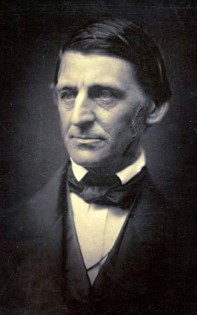Most of us got introduced to Ralph Waldo Emerson sometime in school. After all, he was one of the leading intellectuals, writers, and speakers during the 19th century. In graduate school, I was reintroduced to him in a course on American Speakers of the 19th Century (yes, one of those courses). I studied his Harvard Divinity School address, and my life has never been the same since.
Let me tell you a little about the address before I get to the effect. The Harvard Divinity School graduating class (all seven of them) chose Emerson as their graduation speaker. The students, faculty, family, and friends gathered to hear the speech. Emerson’s thoughts were so radical that he was not invited back to Harvard for several decades. He spoke about the divinity of mankind, the intuitive soul within us that is pure and that we also fail to heed. And he charged the audience to listen to that voice.
I thought that was a great speech. After all, he had managed to offend academics in an academic setting so thoroughly that there were protests.
He did something else for himself. Emerson had a purpose when he spoke. He wanted to challenge, provoke, and stimulate thoughts in his audience. In the Harvard address, he said this, “The moment our discourse rises above the ground line of familiar facts, and is inflamed with passion or exalted by thought, it clothes itself in images. … Hence, good writing and brilliant discourse are perpetual allegories. This imagery is spontaneous. It is the blending of experience with the present action of the mind. It is proper creation.”
One of Emerson’s biographers explained it this way, “Perhaps his greatest gift as a lecturer was his ability to make everyone “feel taller.” He so aspired for integrity and purity that his example gave strength to others. A reporter asked a washerwoman who always attended his lectures in Boston if she understood Mr. Emerson. “Not a word,” she replied, “but I love to see him standing up there thinking everyone else is just as good as he is.”
Let me be a little too transparent for a moment. I so loved his purpose that I took it as my own. I’d like to say that as a teacher, trainer, and coach, my goal is to always push or pull people into thinking about things differently, to recognize that they are capable of so much more than they let on. I would rather reach too high than let my audiences settle too low. And no matter what else is going on, I can remain pretty true to that purpose. It doesn’t interfere with any other goals that I might have at the moment.
You may be wondering about my point in this essay. Here it is. In sales, as in most pursuits, we have a choice of goals. We can follow our passions, support our clients, and on and on. What is the one thing you can always do, without exception, to make the people you encounter feel taller?
Want to learn more about finding a leader’s purpose?
Being a leader is more than managing sales and recruiting. Being a leader tests your self-concept and relationship skills. The Direct Selling Leaders Network is the Facebook group known as a safe place to share questions and answers about growing your business. Leaders are curious. This is a great group to find out some answers.
The Direct Selling Leaders’ Network is the Facebook group for leaders like you. This social learning community is the premier online community for direct selling leaders, future leaders, and those who want to create their future. Leadership is a way of life, not just a position. Join us as we add new FREE content every week! Recruiting, Getting Your Team to Work, and Tips on Working Smarter, Not Harder. NOT A MEMBER? Please join some of the best leaders in direct sales.



